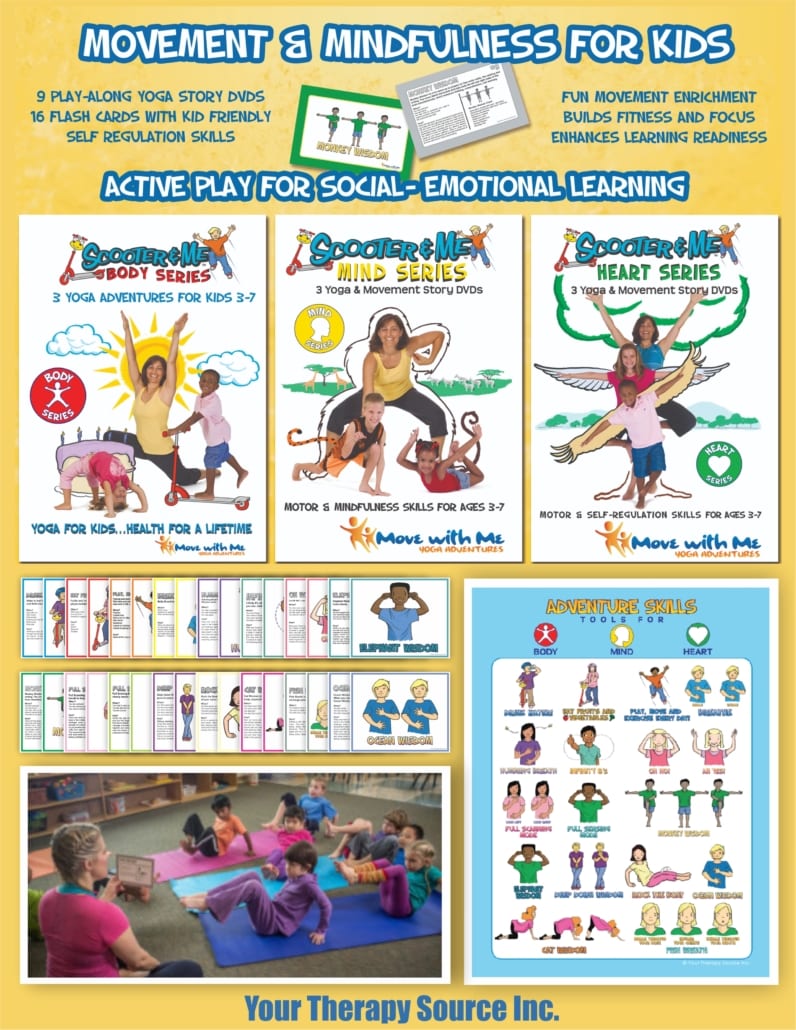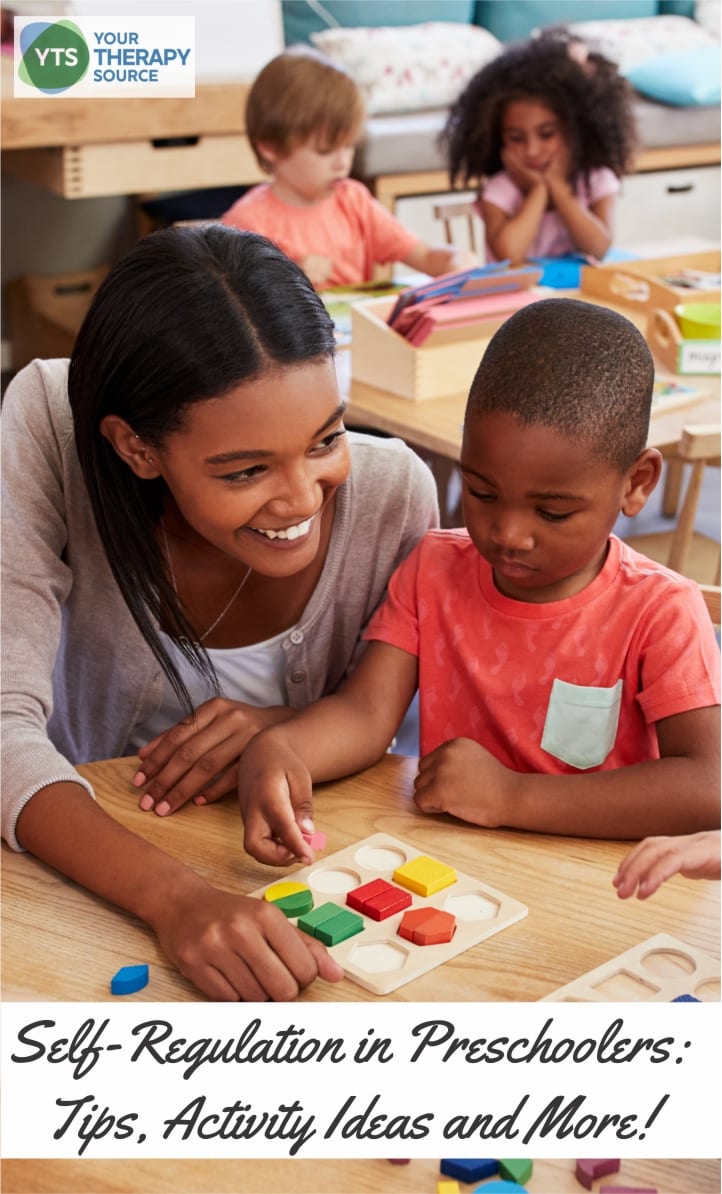Self-Regulation in Preschoolers: Tips, Activities and More!
Active play, sensory exploration, and self-care exercises are whole child activities that develop self-regulation in preschoolers and support all other learning. The more movement and mindfulness are integrated into early childhood education, the greater the development of focus and executive function! In the face of the compartmentalization of learning with domains and standards needing to be checked off a list, it’s SO important to hold the BIG picture!
Practice and Teach Self-Regulation in Preschoolers that Make Sense
If you want to help improve self-regulation in preschoolers remember that learning and socialization happens in the body. Keeping that in mind, the importance of:
- fulfilling the health standard requiring 90-120 minutes of supervised active play and physical education makes sense.
- Mindfulness practices, relaxation, visualization, and breathing exercises make sense.
- Using a set of tools for self-regulation, practicing yoga or stress management techniques, or Brain Gym® exercises make sense!
Why? Because when we feel relaxed, alert, and engaged, we develop calm, self-awareness, and the ability to focus, plan, analyze, reflect, and create. Conversely, when we are continually responding to the constant stream of alerts from our environments, the more we cultivate multi-tasking and feeling impulsive, fractured, stressed, and emotional. Given the bombardment of stimuli in most of our lives– whether they are from the classroom: voices, movement, toys, visuals, or from our technology: cell phones, computers, screens – it’s understandable that so many of us are dysregulated and describe feeling stressed.
How to Help Preschoolers Who Struggle
Children with fewer coping and filtering skills, are particularly vulnerable, which make it paramount to teach self-care and practice self-regulation techniques with preschoolers. When children are constantly reacting to whatever stimuli is happening, their lower brains are in charge. This creates a brain and nervous system that literally cannot settle. It is a sophisticated body-mind coordination to self-regulate such that we can shift our attention away from the omnipresent flow of new sensory information and allow our neocortex, thinking brain, to focus on a task or project.
The Brain and Self-Regulation
In Daniel Goleman’s latest book, Focus, he describes attention as a constant interplay between our lower (reptilian) brain and our upper (neocortex) brain, linked by our mid-brain (emotional center).
The lower brain operates largely outside of consciousness monitoring signals coming in from our senses to changes in our environment, sensations in our body, or memories of worrying events.
Our mid-brain, emotional center, filters and organizes these sensory messages, deciding whether we are safe, should be curious, on alert, or distressed.
The upper brain’s job is to screen out distractions and focus on a single task or train of thought in order to plan, create, and reflect. To build those focus muscles takes practice, especially for young minds easily distracted and emotionally sensitive.
The more we self-regulate and think/act mindfully, the more we help children to do so, too. The more we implement rituals of that include active play, slowing down, reflection, and self-care, the more we engage the upper brain. This, in turn, helps us learn how to calm our body and shut out external distractors.
5 Activities to Help Self-Regulation in Preschoolers
It is through self-regulation that focus, creativity, and learning come alive. Here are 5 activities that you can integrate into your daily routine to help children build a foundation for self-regulation, focus, and executive function:
- Take Movement Breaks that include both aerobic and slow, intentional, cross-lateral movement. Examples: music with props or creative movement directions, drumming, yoga cards, a movement story, an adventure skill. Try combining fast and slow, and end with relaxation and recharge to both enhance learning and reset the central nervous system. Try these gross motor activities for preschoolers.
- Slow Down – practice slowing your inner speed and speaking speed. Support children in doing the same with slow breathing exercises, slow motion moving, regular rest, and mindfulness activities. Encourage observation and exploration. When things are slowed down, it is much easier to become aware of how you really feel and to be thoughtful. Try the yoga lesson plan – I Can Slow Down.
- Drink Water – every 20 minutes you and your class should be sipping water. Combine getting water and enjoying a movement break. A fun way to develop focus and control is to have children move through an obstacle course while carrying a very small paper cup of water, and trying not to spill any.
- Practice Friendliness and Kindness using Pretend Play. Take interactions from real life or books that show different kinds of interactions and responses and re-enact them exploring new behavior choices. Example: Because one of the important things we are learning is how to be kind to ourselves and our friends, we are going to use the problem/ challenge that Mary and Amelia had and act it out in different ways. Do different behavior choices give us different results?
- Build reflection into every activity. Ask questions and support children in growing self-awareness and emotional literacy. For activities: set intentions/goals, mirror accurately during the process (give words as needed), and complete with reflection to nurture their observation, self-awareness, and self-trust/confidence.
Examples of Self-Reflection for Self-Regulation in Preschoolers (and adults)
Here are some examples and prompts for self-reflection to help with self-regulation in preschoolers.
Let’s finish ______ time by reflecting. That means asking ourselves questions and being honest and thoughtful about our answers.
How did I do around the intentions/agreements we made before we started?
How did my body feel before, during, now?
What happened in my thinking / brain / senses / fingers / breathing etc. as I ________?
Was I focused / frustrated / happy / have lots of ideas / looking around / bored?
How did I help myself?
What distracted me?
What did I enjoy most?
Resources to Help Teach Self Regulation Activities for Preschoolers
If you are looking for child-friendly activities that support well-being, physical development and enhance social-emotional learning check out the 16 Adventure Skill Self-Regulation Flash Cards.
Use them at home and at school to:
- encourage physical activity
- take a brain break
- Teach/Reinforce the use of the Scooter & Me Adventure Skills
- Manage stress and enhance well-being, focus, and learning
- Develop impulse control, thoughtful behavior, and emotional resilience
The activities are a combination of creative movement, yoga, Brain Gym(R), and educational research to optimize physical and cognitive development.
Looking for even more self-regulation resources?
The Scooter and Me Bundle Series includes 9 Yoga/Movement Story Videos in Mp4 format along with the Adventure Skill Flash Cards. All of the video sessions are comprehensive and balanced. The activities are a combination of creative movement, yoga, Brain Gym(R), and educational research to optimize physical and cognitive development. Stories are thoughtfully written to teach social-emotional lessons. The parent and teacher guide supports you in building on the skills and lessons in the stories.
Post was originally written by Leah Kalish.






